This blog’s been focussing on Hindi cinema for a while now, so I decided it was time to get back to being a bit more diverse. And this time with a film from one director whose work I admire a lot: Akira Kurosawa. If all you’ve seen of Kurosawa are his samurai films, I’d recommend Tengoku to Jigoku (High and Low) as a good way of getting introduced to the films he made in other genres. If you’ve never watched a Kurosawa, this is still one of his best films – and one of the best classic crime films I’ve seen.
Loosely based on King’s Ransom, a novel by American crime writer Ed McBain, Tengoku to Jigoku is about a kidnapping and its repercussions. The result is an unforgettable film that brilliantly combines the personal, the social, the psychological, the dramatic and the mundane, with the sheer sweat-and-drudgery of the police procedural.
The story begins in the large, smart home of Kingo Gondo (Toshirô Mifune). Gondo is one of the executive directors of a shoe company, National Shoes. He’s risen the hard way: 30 years ago, he began as a 16-year old apprentice to the ‘Old Man’, who owns National Shoes. Today, Gondo is a wealthy man, with 13% of the shares in National Shoes.
The three other directors of the company have come together at Gondo’s house to decide the future of the company. Other than Gondo and these three men, the only other individual present in the room is Gondo’s assistant, Kawanishi (Tatsuya Mihashi).
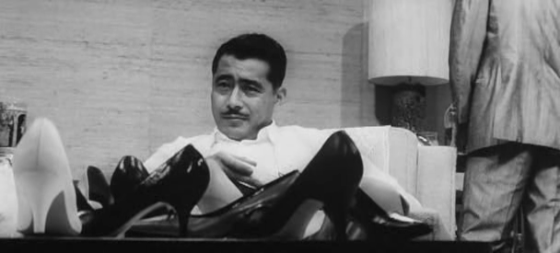
Differences of opinion surface rapidly. Gondo is the only one who believes that National Shoes should concentrate on making quality shoes. Good designs, good workmanship – and durability. The other men scoff at Gondo. They accuse him of being old-fashioned, like the Old Man (who, one of them jeeringly says, would be happiest making army boots). What National Shoes needs in order to make money are shoes that look pretty but wear out soon. What National Shoes needs is to throw the Old Man and his defunct ideas out.
But the Old Man is sitting on 25% of the company’s shares; even with the 21% the other three directors hold, they cannot dislodge the Old Man.

So, the other men have a proposition to make: if Gondo, with his 13%, joins them, they’ll hold a total of 34% of the stock – and they can oust the Old Man.
But Gondo refuses, and refuses bluntly. He will not give up his principles for wealth and power. A National Shoes controlled by a conglomerate for which profit is preferable to conscience… no, he will not be a part of that. Like the Old Man, he would rather make good shoes, ‘real shoes’, than be driven by this greed.
The scene ends with a furious Gondo throwing the three other directors out of his house.
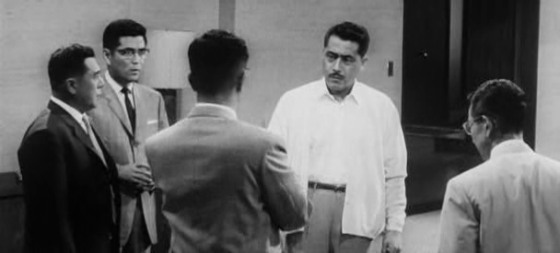
Within the next few minutes, a lot is revealed. Gondo’s wife Reiko (Kyôko Kagawa) emerges just as the angry directors are leaving, and realises that trouble is brewing.
Then, the Gondos’ little son Jun bursts into the living room along with his playmate Shinichi. Shinichi is the son of the widowed chauffeur Aoki (Yutaka Sada). The two boys are about the same age and are the best of friends – in fact, they’ve been playing sheriff-and-outlaw this evening, and have switched ‘costumes’ a couple of times, so that even Reiko, seeing Shinichi, for a moment mistakes him for Jun.
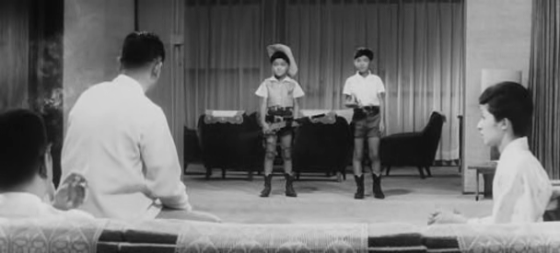
While the boys run off, Gondo receives a phone call from Osaka. The phone call leaves him pleased and quietly triumphant; he immediately gives instructions to Kawanishi to phone and book a flight for that night itself, for Kawanishi to go to Osaka. When Kawanishi returns – he’s booked a seat on the 10 PM Tokyo-Osaka flight – Gondo reveals the ace he’s had up his sleeve all this while.

The fact is that Gondo’s share in National Shoes is not the paltry 13% everybody’s believed it to be. He has, over the past three years, acquired a further 15%. And now he’s on the brink of buying another 19% of the shares, through someone in Osaka. Gondo’s total stock in National Shoes will go up to 47% – enough for him to control the firm.
He now makes out a cheque for ¥50 million and gives it to Kawanishi, to be handed over at Osaka in exchange for the shares.

Everything is ready for Kawanishi’s departure – Aoki has been summoned and told to get the car out – when the phone rings.
… and the Gondos’ world falls apart. At the other end of the line is a man who tells Gondo that he’s kidnapped Gondo’s son, and that the child will be returned only if Gondo agrees to pay a ransom of ¥30 million.
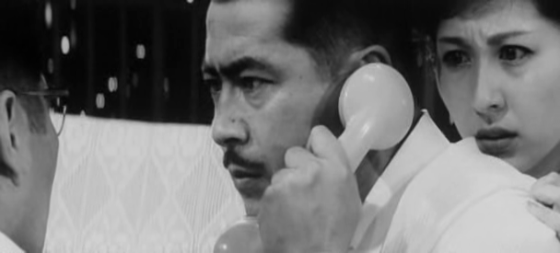
Panic ensues, of course. Kawanishi’s first reaction is to call the police; Gondo stops him, saying that that could well get Jun killed.
Just as Gondo is getting ready to make arrangements to withdraw the ¥30 million from the bank, who should walk in but – Jun! So was it all a prank…?

But no; the very next moment, Gondo realises this is not a prank. Shinichi is missing. Shinichi, the same age and size as Jun, dressed in the clothes Jun had been wearing just a short while back. Aoki, on whom the realisation dawns simultaneously, races off into the night, yelling for his son and hoping that the boy is out there somewhere.
Gondo, meanwhile, phones the police. (“No! The kidnapper might hurt him!” Reiko cautions, but Gondo is blunt and matter-of-fact in his reassurance to her: a mere chauffeur cannot pay a ransom; the kidnapper will have to let Shinichi go).

The police team – disguised as delivery men – arrives soon after, led by Inspector Tokura (Tatsuya Nakadai) and Chief Detective Taguchi (Kenjiro Ishiyama). Within a short while, they’ve rigged up a system to tap and record the phone, and they’ve stationed a man to try and trace the next phone call… which they’re sure will not be long in coming.
It does, and the kidnapper’s reaction is not quite what Gondo had imagined.
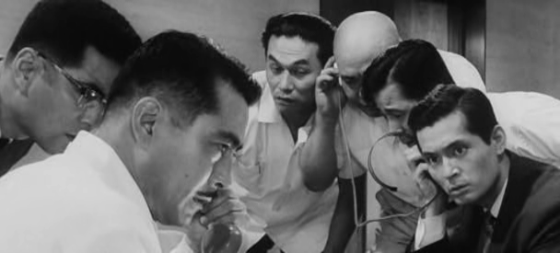
Instead, though the man admits he made a mistake, he is cold-blooded enough to add that it makes no difference. So what if Aoki cannot pay Shinichi’s ransom? Gondo can. Gondo has the money to do it.
Gondo, of course, refuses outright. Why should he pay? (He has, as he later admits to Reiko, mortgaged everything they own – down to their house – in order to get those all-important shares from Osaka. If he gives those ¥30 million to Shinichi’s kidnapper, not only will he not get control of the company, he will lose everything).
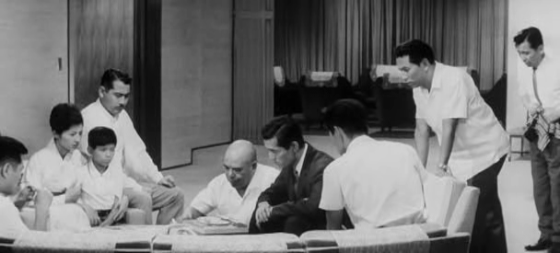
This is not just a tense moment; it is a long, uncomfortable, embarrassing night for all. Aoki, the desolate father, sinks to his knees and begs Gondo to help him. “Shinichi and I will serve you till we die”, he wails.
(This, incidentally, is one of the subtly great scenes in the film. Aoki is on his knees, bent over double as he pleads with the only man who can save his child. Gondo is pacing about, almost trying to flee Aoki [and his own conscience?]. For the next couple of minutes, everybody looks away from Gondo and Aoki, the same embarrassment mirrored in all their faces. It’s an interesting snapshot of human feelings: the pleading of the terror-stricken father; the dilemma of the man he’s pleading with; the awkwardness of the others – the ‘spectators’ – in the room).
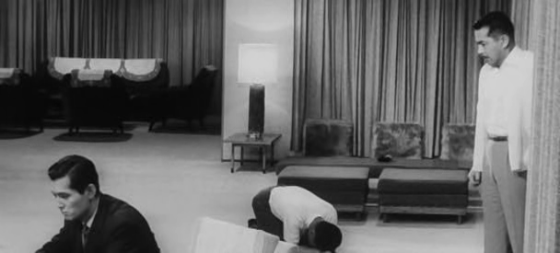
When they’re alone together, Reiko confronts Gondo and tries to be his conscience. Just a while back, he hadn’t thought twice about paying ¥30 million to bring back Jun; surely money cannot take the place of simple humanity?
When Gondo flings back at her the fact that they will be left almost penniless – he will have to begin all over again – Reiko says that they will manage. He can manage, Gondo says; but will Reiko – brought up in luxury, used to vast amounts of wealth – will she be able to survive poverty?

Gondo has obviously made up his mind to hang on to his money.
But the next morning, when the kidnapper phones with further instructions, Gondo has taken a decision. Or, rather: his conscience has taken a decision. Shinichi cannot be left to the mercy of the kidnapper. It will ruin Gondo, but he will pay up the ¥30 million.
The kidnapper gives explicit instructions. Gondo is to put the money (not in consecutive serial numbers, and in denominations that the kidnapper specifies) in two bags, each no more than 7 cm thick. He is to take the bullet train, and will receive instructions along the way.
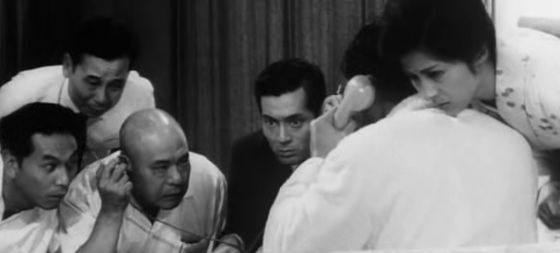
The long and the short of it is that Gondo ends up throwing the two bags from the train, at a river where the train slows down. The bags are picked up by someone who’s standing on the riverbank with Shinichi. Shinichi is let go, and is quickly collected by Gondo and the cops who’ve been with Gondo all this while. The kidnapper – or his accomplice, they still don’t know who – gets away with the money.
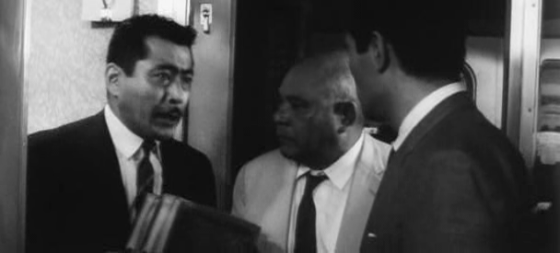
Shinichi is safe. But Gondo has been ruined. (Literally, in fact: Kawanishi has already defected to the other directors, and comes to gloat over Gondo’s misfortunes and to let him know that he is now no longer a director of National Shoes).
It is at this point that Inspector Tokura, Taguchi, and the Chief of Investigation (Takashi Shimura) decide that, with no threat to the child now, they can go hell-for-leather after the kidnapper. The least they can do is get back Gondo’s money for him.
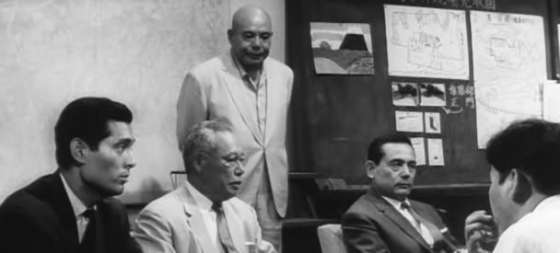
But how? The clues seem almost non-existent. The kidnapper has hidden himself too well. Who is he? Where does he live and work? What was his motive? And how can they ever set about finding him?
What follows is a very well-plotted police procedural, as Tokura and his team go out into the streets of Tokyo (and beyond) searching for anything that might point the way to the kidnapper – and somehow bring Gondo back from the brink.
What I liked about this film:
Everything. The story is excellent, the direction top notch, the acting uniformly superb (though I must admit a particular admiration for Mifune, probably my favourite Japanese actor).
What I found especially interesting was the title of the film, and its connotations in the story itself. I’ve read (since I don’t know Japanese) that tengoku to jigoku literally means ‘heaven and hell’. The ‘official’ English title – ‘High and Low’ – is more appropriate, I feel, because of the many meanings it has in relation to the story. There is Gondo’s life itself: beginning low, as a poor apprentice, and reaching a high as a director of National Shoes – and then plummeting again to a low just as he had been preparing to scale another high.
There is the ‘high’ and the ‘low’ difference, of relative wealth and status, between Gondo and Aoki. There is, even fairly early on in the film, an indication that Gondo’s house, up on a hill, is literally much higher than the shabby tenement the kidnapper inhabits. And there is, of course, the obvious difference in the status and wealth of the kidnapper and his victim (in one of his first phone conversations with Gondo, the man taunts Gondo by saying that Gondo lives in air-conditioned comfort while people like him – the kidnapper – have to live in the heat).
Tengoku to Jigoku is not just a superb crime film; it also offers a good insight into individuals. Gondo, caught in a struggle between his conscience and his natural desire to not throw away all those years of hard work. Reiko, horrified at her husband’s hard-heartedness, but speaking, all along, from the cocooned luxury she’s used to… there are shades of grey here. Not all is black, not all is white. Kurosawa even gives us a glimpse of the kidnapper’s perspective (a literal glimpse, this, towards the beginning of the film: we see, from the kidnapper’s grubby window, a view of Gondo’s house up on the hill. It was, I found, surprising effective in conveying the emotions that luxurious, far-away house, so unattainable, could evoke).
Finally, the careful details that enhance the experience. In the first scene, a cardigan-clad Gondo, in his beautifully air-conditioned house. Later in the film, a Gondo who has lost nearly all his wealth – spending his time mowing the lawn, wearing trousers and a bush shirt. Yes, his house is still there, still air-conditioned and plush, but perhaps Gondo is trying once again to get used to being a poor man?
And the cops, making their way around the most squalid parts of Tokyo, their shirts stuck to their backs with sweat, or constantly wiping their foreheads as they sit around their office and discuss the case…
The last scene, incidentally, is one of the most powerful I’ve seen.
What I didn’t like:
One scene, towards the end of the film, which is set in a nightclub. Too protracted, in my opinion. But, for a film that is nearly 2½ hours long (and manages to be nail-bitingly engrossing through it all), that’s a minor flaw.
A Note and Some Comparisons:
For those of you out there who are interested in 70s’ Hindi cinema: Tengoku to Jigoku was remade in 1977 as the Vinod Khanna-Vidya Sinha-Dr Shreeram Lagoo-Amjad Khan starrer, Inkaar. The first half of the film (barring the romance angle) is almost identical to the Japanese original. The second half goes its own way, with a more romanticised view of police work, turning the cop into the all-fighting, all-conquering hero Indian audiences were more used to. The clues change too, and there are differences in the way the story plays out. Inkaar isn’t a bad film – in fact, it’s a good, solid Bollywood crime thriller – but if you’ve seen Tengoku to Jigoku, it does fall pretty flat.


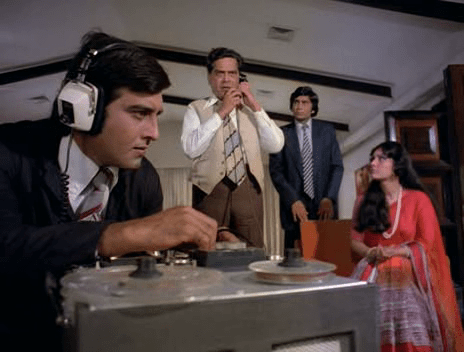
So this is the original of Inkaar! And under the direction of Kurosawa! Wow, it must be …. like WOW!
Last I have five DVDs of Kurosawa films, but this one is not a part of that collection!
Love Kurosawa!
LikeLike
Yes, it is WOW. Before I saw Tengoku to Jigoku, the only Kurosawas I’d seen were samurai films like Seven Samurai and Yojimbo. But he’s equally fantastic here – I couldn’t recommend this film more, it’s so good!
By the way, have you seen Nora Inu (Stray Dog)? Another noir from Kurosawa, starring a very young Mifune as a cop whose pistol is stolen. That’s more noir, less a suspense thriller than High and Low, but also very good.
Add me to the ‘Love Kurosawa’ list! :-)
LikeLike
Echoing Harvey about Inkar. Now I have to get Kurosawa films.
LikeLike
You must. I have to admit that I’ve tended to steer clear of these much-touted directors, simply because I feel that their work is going to go right over my head (I’m not intellectual, you see…!). But Kurosawa came as a surprise – a very pleasant surprise. I haven’t seen too many of his films yet, but just one film down the line, and I was wishing I’d started on his films much earlier. He’s brilliant.
LikeLike
Dustedoff: very nice post, but I’m a little surprised that you ever thought of Kurosawa as a director whose work might go over your head. He’s one of the most accessible of foreign-language filmmakers, especially for a viewer who is familiar with Western pop culture – and he’s generally regarded as very populist compared to Ozu, Mizoguchi, Naruse and the other great Japanese filmmakers of that period.
If you’re interested in his more low-key works though, do try to see his fine adaptation of Gorky’s The Lower Depths and also Record of a Living Being (with Mifune playing a man twice his real-life age – it’s one of his most unusual roles).
LikeLike
Thank you, Jabberwock – I’m glad you liked this post. I’ve been raving about Tengoku to Jigoku to everybody who’ll listen ever since I first saw it a couple of years back.
“I’m a little surprised that you ever thought of Kurosawa as a director whose work might go over your head.”
My sister and her classmates, back in their college days, used to refer to highbrow stuff as ‘intel lobs’ – intellectual ‘lobs’ that went right over one’s head. There’s a lot of stuff out there that constitutes intel lobs for me. And I’d rather admit I haven’t seen a film, than admit I’ve seen it and not understood it. ;-)
I do have The Lower Depths lying at home, but haven’t got around to watching it yet. Will do, now that you’ve recommended it. And thank you for the Record of a Living Being recommendation – I hadn’t come across that, but will look out for it now.
LikeLike
Oh I understood what you meant about highbrow stuff potentially going over your head – just wondered about someone like Kurosawa falling in that category. Anyway, do have fun watching some of those other films – hope your print of Lower Depths isn’t the same as the one I have at home (the subtitling is horrible, completely ruined the experience for me when I tried to watch it again – thankfully I had seen it on a Criterion DVD the first time around).
LikeLike
The Kurosawa films, which I have are:
The Quiet Duel
Ran
Rashomon
and
Madadayo
I have seen till now only Rashomon and was floored. I had thought of writing a review, but I just couldn’t put into words all that was swirling through my head and heart at that time.
Watching Rashomon was like opening of a fourth dimension. No exaggeration!
LikeLike
Ah. The only ones of those that I have is Rashomon. Considering it’s among his best-known films, I’m very embarrassed to admit that I haven’t got around to watching it yet. Will do, this weekend!
LikeLike
Thanks for going back to international cinema. I have not seen this Kurosawa film: will do so now!!!
LikeLike
And I’m glad to be back watching a somewhat wider range of films! (I just rewatched an old favourite – I Soliti Ignoti – the other day, mainly because I needed cheering up).
Do look out for Tengoku to Jigoku – it’s very good.
LikeLike
Tengoku to Jigoku might be better than Inkaar. But Inkaar surely has better songs than Tengoku to Jigoku!
AND…
LikeLike
:-D
I think, though, that Inkaar might have benefited from not having any songs, like Kaanoon or Ittefaq – this film had a pretty good storyline, so keeping the story going instead of interrupting it with songs – no matter how good – might have worked.
LikeLike
But still, Inkaar has better songs than Tengoku to Jigoku! ;-)
:-)
LikeLike
:) I liked these two songs from Inkaar as well. :), but I see the songless movie point.
LikeLike
a diplomatic answer, samir!
just imagine, life without these two songs! okay, it is not as if we wouldn’t have mobile phones or PCs, but still… ;-)
*ggg*
LikeLike
Okay, now that you guys are going overboard with the songs from Inkaar (incidentally, neither of you has yet mentioned this one, Dil ki kali, featuring Rakesh Roshan in a cameo):
… anyway, now we come to an important point: Tengoku to Jigoku does have a good soundtrack. Some is borrowed, of course – there’s a vital scene where the extremely-appropriate-to-the-occasion It’s now or never is being played in the background…
… and there’s the nightclub scene, which (while there are no words) has a pretty great music score, and plenty of stuff happening onscreen too:
LikeLike
Now this is an answer, which was awaiting from you! ;-)
Thanks for that clip, madhu! Is that the scene, whic you mentioned, that you didn’t like? I can understand your feelings. It doesn’t seem to have much bearing to the the plot for the major part of it. But on the other hand, without the context of the film, it is difficult to come to a decision!
Your writing is always so good, that I have started taken it for granted. But when I see, what difficulties I have to form a straight sentence, my admiration grows!
LikeLike
You are too lavish with your praise, harvey! Thank you. :-)
Yes, this is the scene that i thought was a little too long. Actually, something important (even though it’s not immediately apparent) does happen in this scene. I did think, though, that other stuff – the waiting around, and so on – was prolonged a little more than was necessary.
LikeLike
Such an awesome storyline. I was absolutely hooked to every single line. And so well-written. Have to see the original as well as the copy. Thanks a triple ton!
LikeLike
Thank you, Sharmi – and I’m glad you liked the review. Believe me, this film is a winner; absolutely fantastic crime thriller. If you’re interested, I’ve added a link for Inkaar (on youtube) in my reply to pacifist’s comment, below.
LikeLike
Yes, very interesting story.
It has now motivated me to watch Inkaar (for the songs of course – LOL)
LikeLike
:-D
LikeLike
I haven’t been able to find an online-viewing link for Tengoku to Jigoku, but Shemaroo have Inkaar on their youtube channel:
I hope you’re able to watch it!
LikeLike
Thanks DO. Will definitely watch this over the weekend. Vinod Khanna is an added attraction, and I do like Vidya Sinha for the nice kind of films she did.
LikeLike
Vidya Sinha doesn’t have too much of a role in this – in any case, she was rather extraneous to the story (Inkaar seems to have split the role of Gondo’s wife Reiko into two parts: the wife, played by Lily Chakravart, is the weepy sort, who breaks down when the child is kidnapped; Vidya Sinha is the sister who remains more or less level-headed and tries to reason with her brother and get him to listen to his conscience).
But this is a great Vinod Khanna showcase. He was one of the main reasons I watched Inkaar in the first place! :-)
LikeLike
Once again a great choice of movie and a great review. Now have to go and see this movie!
Mifune has to be one of the most captivating personalities on screen. One of my favourite actors of all time.
I’m tempted to ask you what happens at the end but the denouement must be quite spectacular if you haven’t put spoilers in :)
LikeLike
“One of my favourite actors of all time.”
Mine, too! When he’s onscreen, I end up watching only him, he’s so good. :-)
Incidentally, the denouement here does not really come at the fag end of the film – the culprit is tracked down and caught before that happens. In fact, the audience is actually shown the culprit (even if we aren’t shown his motives) pretty much towards the beginning of the film. But the last scene is an important confrontation, and is hauntingly good.
LikeLike
Madhu, welcome to the ‘Love Kurosawa’ club. :) I first saw Rashomon when I began working and was hooked. The next film I saw of his was Ran, followed very quickly by Throne of Blood, Seven Samurai, Subarashiiki Nichiyobi in quick succession. I was hooked! I have seen this film, oh, too many years back – it’s time to revisit it. I didn’t know Inkaar was a remake! I have to see that also!
Thanks for a wonderful write-up (as always!)
LikeLike
Oh, I’ve been part of the ‘Love Kurosawa’ club since the first Kurosawa film I saw. He’s amazing, isn’t he? I have a couple of un-watched DVDs (including Drunken Angel, Rashomon and The Lower Depths) at home. I think it’s about time to watch them. And perhaps, time permitting, rewatch a few of the others too. :-)
LikeLike
Sounds really interesting! Now the only question is, when and how do I go to Blockbuster to look for this movie? Thanks for the crisp, spellbinding review, DO!
LikeLike
Thank you, Lalitha!
By the way, it is on Blockbuster, billed as High and Low:
http://www.blockbuster.com/browse/catalog/movieDetails/15414
I hope you get around to watching it sometime. It’s a fantastic film.
LikeLike
High and low is really a great film although not as great as Seven Samurai or Rashomon.And Kurosawa is just what we call-a Phenomenon.Kurosawa and Ray ,in my opinion ,are the two greatest directors Asia ever saw.[Most would agree with my opinion,i think].And yes,it’s a pity that some think that Kurosawa only directed Samurai films whereas in fact he has directed a whole range of films belonging to different genres.I have seen so far 10 films of Kurosawa and each is a gem.I am yet to watch stray dog but hope to catch it soon.
and yes,watch Rashomon soon,it’s Kurosawa’s best film along with Seven samurai & Ikiru.
Coming back to High And Low,i was left little disappointed by the end.THE END WAS DIFFERENT BUT SOMEHOW DID NOT GEL THAT WELL WITH THE MOOD AND THE TREATMENT OF THE REST OF THE FILM.[it’s completely my view though].
NOTE- IS NOT THE SONG ‘IT’S NOW OR NEVER’ [one of my favs] IN THE MOVIE TOO.
LikeLike
In my opinion, High and Low is as great as Seven Samurai – in a completely different way, but as intricate, as unforgettable and as complex as Seven Samurai. Stray Dog is good too, as a noir film, but not in the more ‘classic crime’ tradition – it’s somewhat surreal in places. But it’s a fine vehicle for the acting of a very young Toshiro Mifune (incidentally, I remember reading somewhere about Kurosawa saying that Mifune’s acting ‘overwhelmed’ Kurosawa the first time he saw Mifune at a screen test).
Minor spoiler follows:
As for the last scene in High and Low, I think what really stayed with me is the impact of it. Of seeing things from the culprit’s point of view – and, as some others have said, of that interesting reflection/superimposition of the two men’s faces… as if Gondo is, on some level, a man similar to the one facing him.
Spoiler ends
By the way, yes; that is It’s now or never (also a favourite song for both me and my mother!) playing in one of the scenes – I’ve mentioned that in one of my comments, above. It’s an instrumental version, though, not the vocal.
LikeLike
oh! i never thought that my comment on the ending of the film would prompt you to write a minor spoiler on it.That was never my intention.Coming back to the end,i too thought that it was powerful and very different but somehow it did not match the thrill feel that the rest of the film had.And i too liked that superimposition of faces.
The instrumental version of IT’S NOW OR NEVER that is used in the film is just as beautiful and soothing as the Elvis version.
And did not Tsutomo Yamazaki did a brilliant job as the medical intern in the film.
note-I know Mifune is brilliant in the film.But then that is not something to be talked about as he is great in each of his films.I did rather talk if he does not deliver a great performance,something which never happened actually.He is someone who i call a genuinely great actor unlike his bollywood counterparts[both old or new] who are more like stars or entertainers than a truly great actor.There are few exceptions though.
LikeLike
That ‘minor spoiler’ alert was simply added because I was going to mention something that might give away a hint of what happened towards the end, so I didn’t want to spoil it for anybody as finicky as me, in case they hadn’t seen the film yet! No problem, actually, since I just wanted to illustrate what it was that struck me as powerful about the end.
By the way, I just remembered that It’s now or never is actually a version of O sole mio.
So if it’s being played as an instrumental, it could well be O sole mio and not Elvis’s song at all.
(P.S. An anecdote. My mother was a fan of Elvis when she was young, and especially liked It’s now or never a lot. Then, she got married and went to stay with her in-laws – and my grandmother, my mum’s mother-in-law was extremely strict and thoroughly disapproved of cinema, music [unless it was church music], and so on. One day, my mum, completely forgetting where she was, began humming It’s now or never while she went about her work! – Fortunately, instead of getting scolded, she got praised – because O sole mio also happens to have been the basis for a hymn, Down from his glory):
My mum escaped only thanks to a coincidence! ;-)
LikeLike
Thanks for sharing your mom’s delightful experience with us.
I know about O Sole Mio but somehow Elvis version is so much entrenched in my mind that i forget about O Sole Mio most of the time.
And thanks for giving a link to the christian hymn.I did not knew about it but it’s beautiful.
LikeLike
Yes, Elvis gives a whole new dimension to O Sole Mio; I too prefer It’s now or never.
LikeLike
This was very educational and entertaining. Should watch this movie soon. My mom would probably know about Inkaar and I may have watched it too. I’m very curious to know how the film ends so will watch it soon hopefully!
LikeLike
Interestingly, in both Inkaar as well as Tengoku to Jigoku, the kidnapper is shown fairly early. In Inkaar, his motive behind the crime comes to the fore long before the end (not the case in the Japanese original, though). But yes, both are good, gripping films.
LikeLike
I downloaded Inkaar recently. I think I will check it out before graduating to Tengoku to Jigoku- for have never seen any Japanese movie :)
LikeLike
I hope you enjoy Inkaar (and I’m hoping you’ll like it enough to write up a review!). I haven’t seen too many Japanese films either… just a handful of Kurosawas. But this one, and Seven Samurai, are a great way to start.
LikeLike
I hope so too… In fact I would love to watch both Seven Samurai and this- but the thing is that I am really hard pressed for time these days- finding to tough to watch enough movies :) In fact my blog is running on drafts saved from a month back!
LikeLike
Yay! I’m thrilled to see you review “High and Low”, Madhu. It’s possibly my favorite Kurosawa film and definitely my favorite Mifune performance. He’s such an extraordinary performer and screen presence. Sigh.
If you haven’t seen it already, I recommend “The Bad Sleep Well” (what a fabulous title, no?) – another superb Kurosawa-Mifune collaboration. But a word of caution, if you love Mifune as much as I do, be prepared to have your heart broken.
LikeLike
Ah, yes, Shalini. I’ve heard about The Bad Sleep Well (and have been intrigued by that title!!). Now I’ll certainly look out for it…. but that little disclaimer of yours about Mifune makes me pause. Oh, dear. :-(
But I lived through Seven Samurai. So I shall steel myself and go ahead and get hold of this one too. Thank you for the recommendation!
(And, by the way: yes, I think this is probably my favourite Kurosawa film too. And Mifune is much better here than in some of his more in-your-face roles).
LikeLike
Pity, oh what a pity! This film isn’t on You Tube, I went searching for it the moment I finished reading the review. I have seen ‘Inkaar’. Like you said it was not a bad film but it is quite irritating the way Hindi films loose the grip on the narrative, making what could have been a taut thriller, show case for the hero’s herogiri. Anyway, I can only imagine how the film turned out.
LikeLike
Do look out for Tengoku to Jigoku (try searching for High and Low – easier to find than the Japanese title) if you ever happen to visit a good music store. I remember having bought the Criterion Collection DVD at Planet M here in Delhi. Excellent print, and it’s a movie worth watching again and again. Flawless.
LikeLike
Actually I searched for High and Low, all I found was the film’s trailer maybe I will look for it at a music store let me see whether I find it.
LikeLike
I am afraid I am in the minority here or even out of here, but I did not feel the greatness vibe from this like I felt from Rashomon, Seven Samurai, Throne of Blood or The Bad Sleep Well. That last title showed that Kurosawa was as capable of making a great contemporary film as he was with period epics, so I had high hopes from this.
Sadly, I just did not find it all that gripping. Part of it lies in the excessively slow pacing. The first half was set in a single location, so Kurosawa’s trademark visuals were throttled. the second half was a rather staid police procedural. Maybe I have been spoiled by much more gripping films of this sort. The tipping point came towards the end: with the seemingly endless nightclub sequence followed by the street surveillance followed by the alley filled with drug addicts. Perhaps Kurosawa wanted to show that he could also showcase the seedier side of city, the “low” or “jigoku” part of the title. I can see his point but he spent so long on it that I sort of went into an uninterested daze.
Still, it does have some good qualities. Mifune is wonderfully understated, though not as impactful as his similarly stoic character in The Bad Sleep Well. Future star Nakadai is also decent as the cop who comes to respect a man whom he had previously taken to be another token member of the idle rich club. Alas, Takashi Shimura has a passing-through kind of role. Seems that after giving him the role of a lifetime in Ikiru, Kurosawa treated him as little more than a token lucky charm in the later films.
LikeLike
Interesting take on the film. I guess one of the reasons I did like this one s much was that it was a police procedural in the second half – I have a particular weakness for well-made police procedurals. Also, I think this was the first ‘modern’ (non-samurai) Kurosawa film I watched, so perhaps the novelty of it contributed somewhat. Anyway, all said and done, it’s still a film I love.
LikeLike